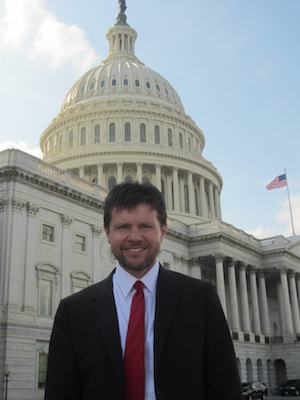

Lee Thomas Miller is in Washington, D.C. this week.
Nashville Songwriters Association (NSAI) President Lee Thomas Miller, and ASCAP CEO and General Counsel Beth Matthews are among those who will testify during a Senate subcommittee hearing titled “How Much For a Song?: The Antitrust Decrees that Govern the Market for Music,” tomorrow (March 10) at 10:00 a.m. EST. Miller will appear on behalf of BMI, and Matthews on behalf of ASCAP, before the subcommittee on Antitrust, Competition, Policy and Consumer Rights to vie for changes to the outdated consent decrees which currently govern the rate setting procedures used by the PROs.
“Performance royalty rates for American songwriters are governed by ASCAP and BMI consent decrees from 1941,” said Miller. “We get paid ridiculously low rates when our songs are streamed through digital music services. Changes must be made or songwriting, as a profession, will become extinct.”
Other witnesses include: Matt Pincus, Founder and CEO of SONGS Music Publishing; Mike Dowdle, VP of Business Affairs and General Counsel of Bonneville International; Jodie Griffin, Senior Staff Attorney–Public Knowledge; and Chris Harrison, President of Business Affairs–Pandora Media, Inc. (If the hearing is streamed, it can be accessed at www.judiciary.senate.gov.)

Elizabeth Matthews
Following the hearing, Miller and ASCAP songwriter Jessi Alexander will perform some of their hits in an event sponsored by NSAI and the National Music Publishers Association.
“We want policy makers to see how little a songwriter earns when their creations are streamed,” said NSAI Executive Director Bart Herbison. “We will present payment information from Pandora illustrating that millions of streams amount to only hundreds of dollars.”
This hearing follows last week’s reintroduction of the Songwriter Equity Act (SEA) in the Senate and House of Representatives. The SEA aims to change the process that sets royalty rates for American songwriters.
Currently, two outdated portions of the Copyright Act, Section 114(i) and Section 115, prevent songwriters from receiving royalty rates that reflect fair market value for the use of their intellectual property.
Section 114(i) forbids federal rate courts from considering sound recording royalty rates as a relevant benchmark when setting performance royalty rates for songwriters and composers.
The SEA would allow the rate court to consider other royalty rates as evidence when establishing digital performance rates.
Section 115 of the Copyright Act has regulated musical compositions since 1909, before recorded music existed. Section 115 allows anyone to seek a compulsory license to reproduce a song in exchange for paying a statutory rate. Today, that rate is 9.1 cents per song and does not reflect market value.
The SEA would adopt a fair rate standard for reproduction (mechanical) licenses that reflects free market conditions.

Category: Featured, Financial/Legal, Organizations, Publishing
About the Author
Sarah Skates has worked in the music business for more than a decade and is a longtime contributor to MusicRow.View Author Profile


